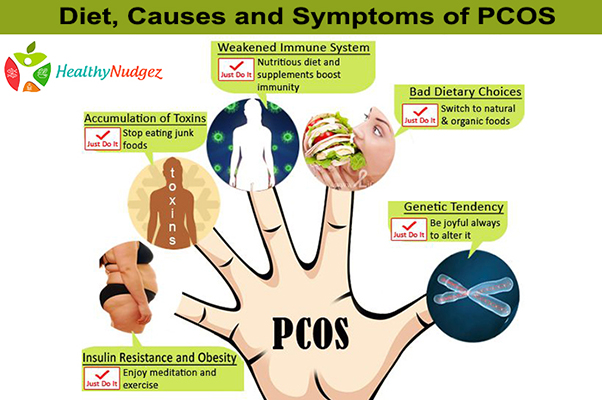Diet, Causes and Symptoms of PCOS
Polycystic ovarian syndrome (PCOS) is a common metabolic abnormality found among females of the reproductive age. PCOS is the most common cause of infertility in women. It is basically a multifaceted disorder in which women are presented with major clinical conditions such hirsutism, obesity, oligomenorrhea and infertility. Primarily characterized by ovulatory dysfunction & hyperandrogenism. Socioeconomic studies from india have observed PCOS as a lifestyle disorder highly prevalent among middle and high income group of population and rarely among rural population.
Weight is a major factor seen in PCOS women, being overweight can increase the risk of getting PCOS, but losing weight or maintaining a healthy weight can be even more difficult with PCOS. In case you are overweight and despite making efforts you are not able to lose, especially around the waist, you might have PCOS. PCOS patients are not always clinically overweight but the disease is strongly associated with abdominal obesity and insulin resistance.
The symptoms can be:
- Weight gain, mainly abodminal obesity and difficulty in losing weight too
- Excessive hair growth around the face, chin, chest, abdomen and also baldness- hair loss from head
- Irregular menses
- Infertility- not able have children
- Acne
- Patches of dark skin on the back of the neck or other areas
- Type 2 Diabetes
Also because of many hormonal imbalances the PCOS cases have emotional imbalance as well as weakness and lethargy.
Today PCOS has become a common but serious endocrine disorder and is a matter of concern, the risk factors can be:
- Effecting 5-10% women of reproductive age (15-45 years)
- Incidence is increasing with change in life style and stress.
- Major cause of infertility among women, along with increased risk of miscarriage and endometrial cancer.
- Strongly associated with insulin resistance (high risk of Diabetes), CVD and Hypertension.
- Cause of Abdominal obesity , acne, alopecia or baldness
- Other symptoms can be anxiety, depression.
Diet plays a significant role in PCOS since majority of the PCOS patients are overweight/ obese or they have abdominal obesity and also because of the insulin resistance they face.
General points to keep in mind for PCOS diet:
- Reduce simple carbohydrates and include foods that have low GI carbohydrates which contribute to dyslipidaemia and also stimulate hunger and carbohydrate craving.
- Low GI diet up to 80%, can improve menstrual cycle regularity and ovulation within six months.
- Even a small difference in weight can show better hormonal results especially resumption of menses.
- Increase fiber intake, such as are found in whole grains, example whole wheat flour, ragi flour, etc., lots of green leafy vegetables, beans, peas, sprouts, etc.
- Dairy products: Low fat milk, cottage cheese and curd should be included in the daily diet. If one is lactose intolerant curd and soya milk should be included in diet.
- Calorie intake should be distributed between several meals per day with low intake from snacks and drinks.
- Liquids: it is advisable to drink plenty of liquids with less of sugar, salt and no caffeine. Include liquids like lemon water, buttermilk, tender coconut water, green tea, soup,etc.
- Include foods low in fat especially saturated fats.
- Increased use of foods rich in antioxidants, women with PCOD have an increased oxidative stress, so they need more antioxidant rich foods to rid the body of extra free radicals. Examples are tomatoes, berries, citrus fruits, green leafy vegetables, green tea, etc.
- Also reduce the amount of salt used in food especially table salt.
- Reduce intake of caffeine as it increases the oxidative stress. Especially in the form of fizzy drinks as they are empty calories.
- Avoid packaged foods specially pre-prepared foods such as packaged oats, gravies, Chinese items.
- Avoid spreads such as cheese spread, ketchups, mayonnaise and other flavoured sauces.
- Moderate physical activity of about 30-40 minutes/ day should be the goal of each patient.
Diet and exercise need to be tailored to the individual’s needs and preferences.

